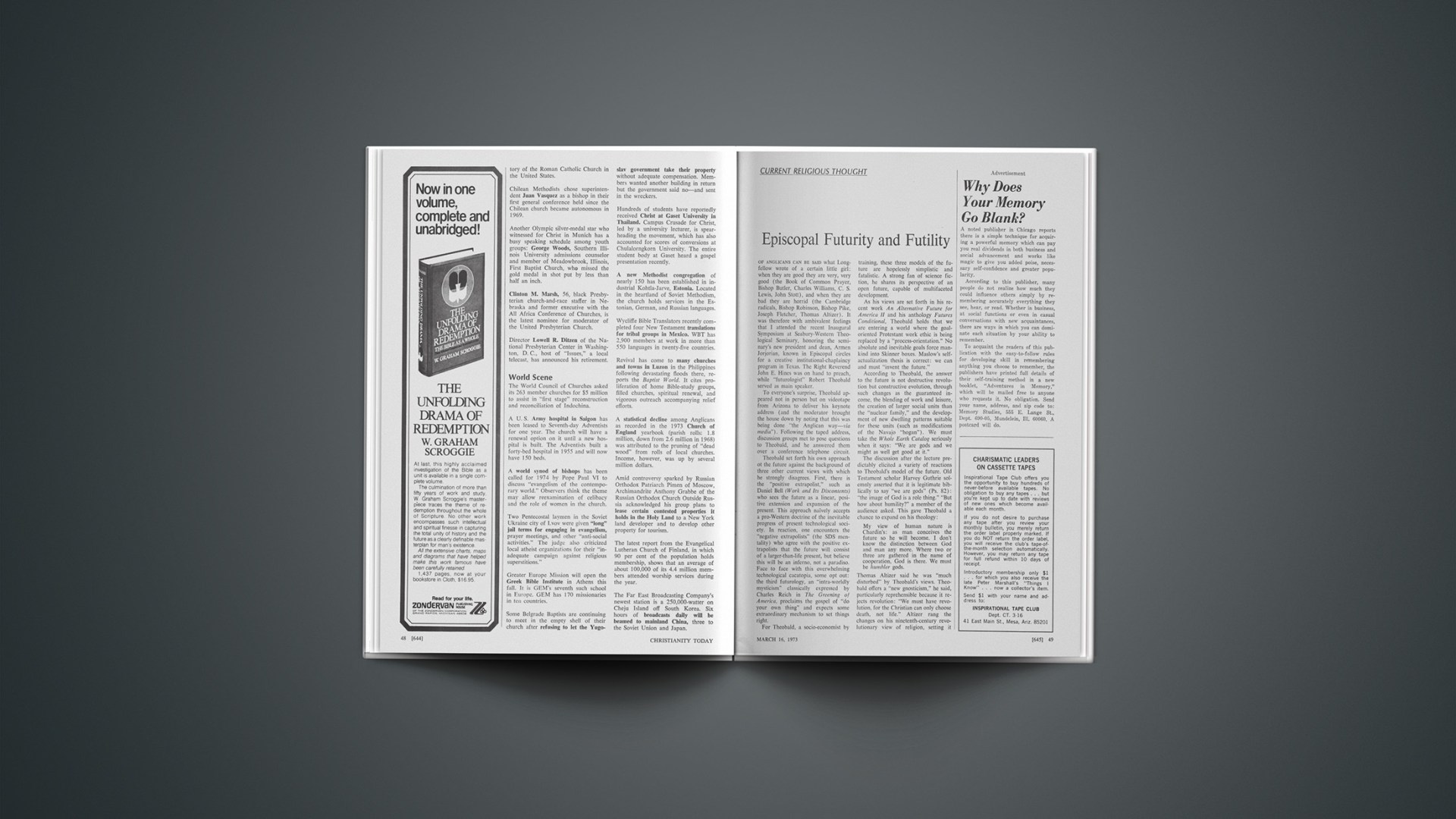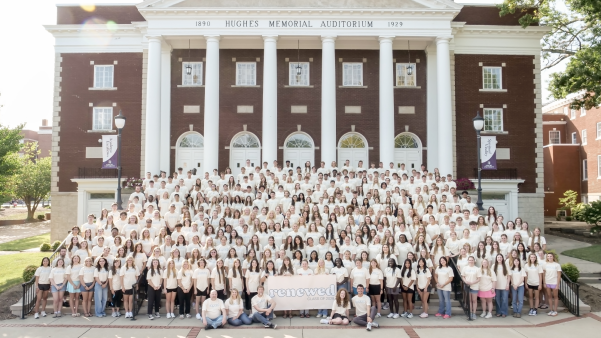Of anglicans can be said what Longfellow wrote of a certain little girl: when they are good they are very, very good (the Book of Common Prayer, Bishop Butler, Charles Williams, C. S. Lewis, John Stott), and when they are bad they are horrid (the Cambridge radicals, Bishop Robinson, Bishop Pike, Joseph Fletcher, Thomas Altizer). It was therefore with ambivalent feelings that I attended the recent Inaugural Symposium at Seabury-Western Theological Seminary, honoring the seminary’s new president and dean, Armen Jorjorian, known in Episcopal circles for a creative institutional-chaplaincy program in Texas. The Right Reverend John E. Hines was on hand to preach, while “futurologist” Robert Theobald served as main speaker.
To everyone’s surprise, Theobald appeared not in person but on videotape from Arizona to deliver his keynote address (and the moderator brought the house down by noting that this was being done “the Anglican way—via media”). Following the taped address, discussion groups met to pose questions to Theobald, and he answered them over a conference telephone circuit.
Theobald set forth his own approach ot the future against the background of three other current views with which he strongly disagrees. First, there is the “positive extrapolist,” such as Daniel Bell (Work and Its Discontents) who sees the future as a linear, positive extension and expansion of the present. This approach naïvely accepts a pro-Western doctrine of the inevitable progress of present technological society. In reaction, one encounters the “negative extrapolists” (the SDS mentality) who agree with the positive extrapolists that the future will consist of a larger-than-life present, but believe this will be an inferno, not a paradiso. Face to face with this overwhelming technological cacatopia, some opt out: the third futurology, an “intra-worldly mysticism” classically expressed by Charles Reich in The Greening of America, proclaims the gospel of “do your own thing” and expects some extraordinary mechanism to set things right.
For Theobald, a socio-economist by training, these three models of the future are hopelessly simplistic and fatalistic. A strong fan of science fiction, he shares its perspective of an open future, capable of multifaceted development.
As his views are set forth in his recent work An Alternative Future for America II and his anthology Futures Conditional, Theobald holds that we are entering a world where the goal-oriented Protestant work ethic is being replaced by a “process-orientation.” No absolute and inevitable goals force mankind into Skinner boxes. Maslow’s self-actualization thesis is correct: we can and must “invent the future.”
According to Theobald, the answer to the future is not destructive revolution but constructive evolution, through such changes as the guaranteed income, the blending of work and leisure, the creation of larger social units than the “nuclear family,” and the development of new dwelling patterns suitable for these units (such as modifications of the Navajo “hogan”). We must take the Whole Earth Catalog seriously when it says: “We are gods and we might as well get good at it.”
The discussion after the lecture predictably elicited a variety of reactions to Theobald’s model of the future. Old Testament scholar Harvey Guthrie solemnly asserted that it is legitimate biblically to say “we are gods” (Ps. 82): “the image of God is a role thing.” “But how about humility?” a member of the audience asked. This gave Theobald a chance to expand on his theology:
My view of human nature is Chardin’s: as man conceives the future so he will become. I don’t know the distinction between God and man any more. Where two or three are gathered in the name of cooperation, God is there. We must be humbler gods.
Thomas Altizer said he was “much disturbed” by Theobald’s views. Theobald offers a “new gnosticism,” he said, particularly reprehensible because it rejects revolution: “We must have revolution, for the Christian can only choose death, not life.” Altizer rang the changes on his ninetenth-century revolutionary view of religion, setting it forth in even more radical terms than he did during the death-of-God controversy in his book The Descent Into Hell. Only by Hegelian dialectic process and Nietzschean eternal recurrence can we “arrive at a new, revolutionary view of consciousness.”
The only put-down to the diffuse theologizing of Altizer and of Theobald came—of all places—from the University of Chicago Divinity School’s Don Browning. Concerning Altizer:
Don’t take him too seriously. The church must not make his mistake of using terms loosely or in the next ten to fifteen years we will lose even more of our credibility.
Of Theobald:
It is good that he rejects the ecological mysticism our church people are falling into, but while we are trying to dig ourselves out of a mastery of life motif, he challenges us to develop new models of mastery. Religion for him is a vast control device. He may be a good Jew and a good Greek, but he is not a very good Christian.
A small black woman in the audience added the only other word of gospel to appear in the entire session: “You must be born again and not try to do it all yourself.” I heard her mutter to herself on the way out: “I can’t stand any more of this; I’m going home.”
Let us hope that she is not one of the last true Episcopalians. Seabury-Western had ninety theological students ten years ago; today it has sixty—and this decline is reflected throughout the Episcopal seminaries of America. That once noble church has so weakened that it could not even discipline Bishop Pike, who denied the incarnation and the Trinity; a death-of-God theologian is still considered one of its luminaries; and it can hold a symposium on the future without once mentioning the return of our Lord Jesus Christ to judge the quick and the dead. The Episcopal liturgies remain magnificent, but, to use Pike’s famous line, they are sung, not said—regarded aesthetically rather than as affirmations of factual truth.
During the inauguration of Seabury-Western’s president, the new incumbent was presented with a Bible and exhorted: “Be among us as one who proclaims the word.” The New Testament lesson was Second Timothy 3:14–4:5: “The Scriptures are able to make you wise unto salvation through faith in Christ Jesus. All Scripture is given by inspiration of God.… Preach the word.… The time will come when they will not endure sound doctrine.… They shall turn away their ears from the truth and shall be turned to myths.” Is anybody listening? The future depends on it.










